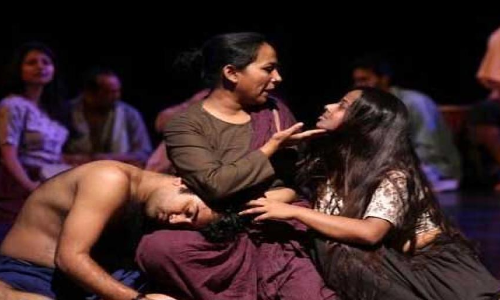Live
- Pokémon TCG Pocket to Introduce Card Trading in January 2025
- Nani unveils ‘MM 2’ title & first look
- Will challenge bail granted to actor Darshan in fan murder case in SC: Bengaluru Police Commissioner
- Chandrahass Launches Maruti Suzuki Dzire Through PJ Productions in Tolichowki Showroom
- Police case against farmers for tilling land claimed by Waqf Board in Karnataka
- Commendable move: Sandeep Dikshit on renaming Sarai Kale Khan ISBT chowk after Birsa Munda
- MahaYuti will come back to power with a thumping majority despite Oppn's tirade: Eknath Shinde
- ‘Hanging up my racquet. Thank you’ - India’s Prajnesh Gunneswaran retires from professional tennis
- Pawan Kalyan to Campaign for NDA Alliance in Maharashtra
- Eight killed, five injured in Nepal's traffic accident
Just In

This was the first law of its kind in India. It was enacted for better control of public dramatic performances and empowered the Government to prohibit public dramatic performances which were scandalous, defamatory, seditious or obscene. This law, among other things, allowed the local Government to prohibit the performance of a play, pantomime, or other drama which could likely excite feelings of
This was the first law of its kind in India. It was enacted for better control of public dramatic performances and empowered the Government to prohibit public dramatic performances which were scandalous, defamatory, seditious or obscene. This law, among other things, allowed the local Government to prohibit the performance of a play, pantomime, or other drama which could likely excite feelings of disaffection towards the British Government.
The Local Government had the authority to ascertain the character of any intended public dramatic performance by applying to the author, proprietor or printer of the drama. However, nothing in this Act applied to any jatras or performances of a like kind at religious festivals.
The Dramatic Performances Act, often shortened to "DPA", was brought into force in the year 1876 under the administration of Viceroy Northbrook. The Act sought to empower the British administration to control better the theatre scene in India.
The Act outlined the restrictions that public performances of a play, pantomime or any other drama would have to adhere to. According to this Act, if the state government judged any play to be of a scandalous nature; disrupting social values; or felt that it might excite feelings of disaffection against the government established by law; or that it would corrupt persons, then the said performance would stand prohibited.
The Act further stated that if any person or groups on whom an order of prohibition had been served refused to comply with the same, such persons or groups would be liable to be punished. The penalty for disobedience of the terms of the Act was either imprisonment for a term extending to about three months, or a fine, or in some cases, both. The Act conferred upon the government the right to information, by which right the persons as empowered by the Act could demand the procurement of all such plays for verification whose content might violate one or many terms of the Act.
The police was granted the license to enter, arrest and seize any persons, scenery, costumes, and or articles whose use or intended use in the performance as prohibited under the terms of the Dramatic Performances Act, had been reasonably established. By this Act, no public performance was to take place in any local area without the sanction of a license.
Following the independence of India on 15 August 1947, this Act was not entirely abolished. Post-1947, many states have introduced their own amended versions of this Act and some have in fact modified it to such an extent that it has even increased the Government’s control over public theatre performance in Independent India. The Bombay DPA, brought into action in 1950, is one such case in point.
Stringent censorship of public theatres has in fact continued in India in the post-independence era. The police have often called upon members of a particular theatre association or individual persons to furnish entire manuscripts of plays for scrutiny by the censorship authorities, which then might or might not be banned or selectively abridged. In 1953, the Indian People’s Theatre Association was faced with such a trial when they were called upon to turn in about fifty manuscripts, which included the plays Nil Darpan and Nabanna.
In 1953, Malayalam playwright and film director Thoppil Bhasi’s play Ningalenne Communistakki i.e. You Made Me a Communist was banned by the Thiruvananthapuram District Magistrate according to the provisions of the Dramatic Performances Act.The government alleged that the play contained provocative material which might prove harmful to the integrity of the state and encourage people to rise in revolt against the government.
This play charts the life of a middle-aged man as he journeys from the cloisters of a conservative upper-class Hindu family to communism. After being banned, the play, its cast and director invited greater trouble upon themselves by violating the ban and performing the play at Kovalam, near Thiruvananthapuram.
This led to the immediate arrest of all the actors of the play. However, an effective opposition from the Communist Party in Kerala compelled the High Court to declare the ban null and void two months later. West Bengal repealed the Act in the year 1962 following persistent agitation from the ranks of the artists’ fraternity.
The India Code Compilation of Unrepealed Central Acts declared in 1993 that the Act is one of the "obsolete laws" that exists in India today. The report of the committee to identify the central acts which are not relevant or no longer needed or require repeal/re-enactment in the present socio-economic context has identified this Act as suitable for repeal.
Syllabus:Modern India

© 2024 Hyderabad Media House Limited/The Hans India. All rights reserved. Powered by hocalwire.com







